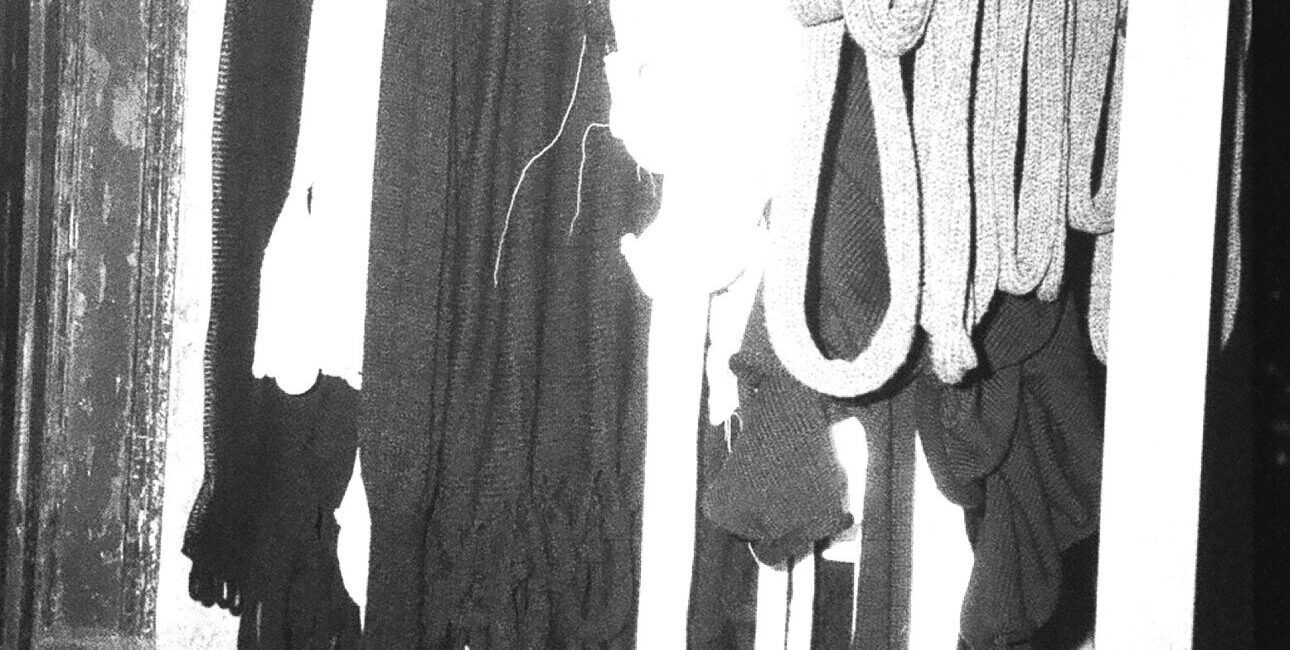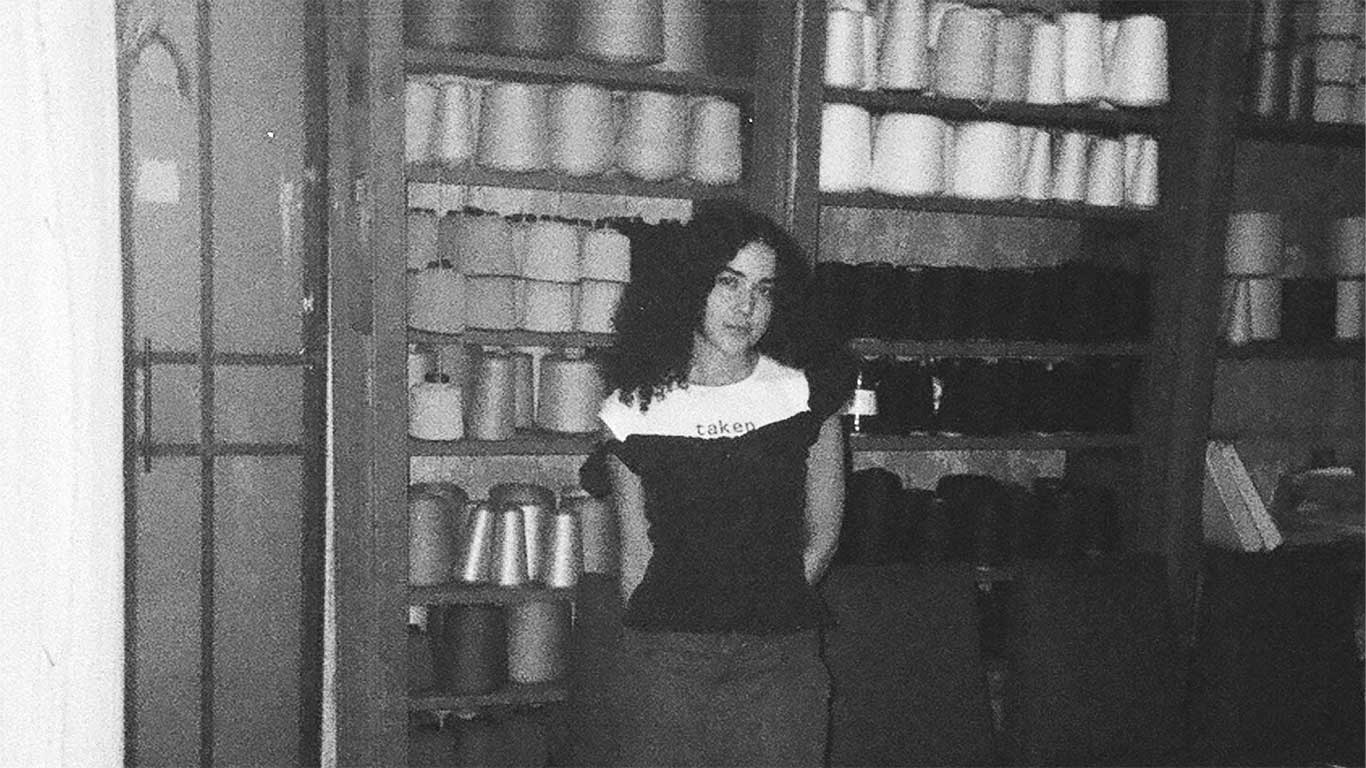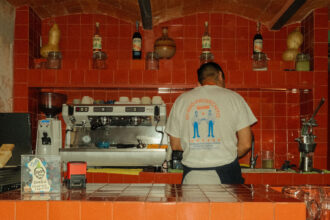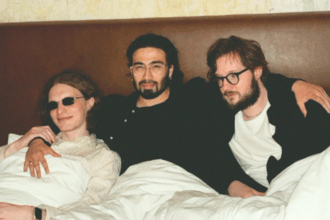Del cuerpo al tejido, del recuerdo a la comunidad: una conversación con Krystal Paniagua
Dentro de nuestro recinto Jardín Prim, donde se albergan estudios de la comunidad creativa de Proyectos Públicos, hay un espacio discreto que se abre como una cajita de curiosidades. Allí, entre rollos de hilo apilados como si fueran instrumentos de laboratorio, fórmulas de patrones escritas a mano, y fotos familiares, una luz cálida deja ver a un grupo de mujeres trabajando con total concentración; el taller en el que Krystal Paniagua teje su ecosistema. Juntas trabajan Minna, Fran, Helen, y la diseñadora puertorriqueña, a quienes visité para platicar, entre cientos de carretes y el sonido rítmico de las máquinas de tejido.
Krystal nació en 1993 en una base militar en Alemania. Su familia, miembro de la Armada de Estados Unidos, se mudó poco después a Texas, y a los cinco años regresaron a Puerto Rico, donde creció. Desde adolescente supo que quería dedicarse a algo artístico. El baile, la actuación, la ropa: todo era parte de una misma pregunta que empezaba a asomarse en su cuerpo: ¿Cómo quiero representarme?
Esa exploración tuvo un punto de giro cuando se fue a vivir con su abuela Carmen. “Abuelita (como la llaman de cariño) fue mi primer modelo a seguir. Tenía un gusto peculiar, honesto, sin disculpas, con mucho estilo. Estar en su casa era vivir una cacería de tesoros constante: cajas con objetos inesperados, sistemas secretos entre el aparente caos. Nunca me parecieron raras esas cosas. Al contrario, despertaba mi imaginación.”
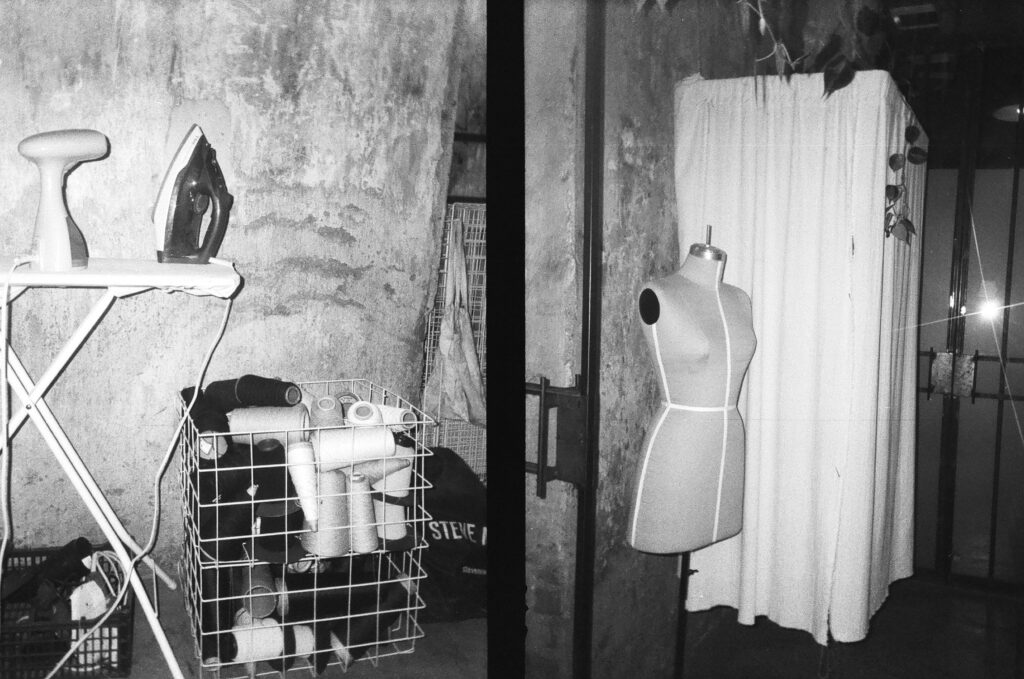
Vista del estudio de Krystal Paniagua en General Prim, uno de los recintos de Proyectos Públicos.
A los 16 años Krystal se compró una máquina de coser, tomó clases e hizo su propio vestido de graduación. Su familia estaba llena de personas autodidactas: una bisabuela costurera, un abuelo que por las noches tocaba clarinete, saxofón y flauta, un tío mecánico respetado, una hermana técnica de uñas. El ejemplo siempre fue claro: si quieres algo, lo haces.
A los 18 años fue aceptada en el Fashion Institute of Technology (FIT) en Nueva York, contra todo pronóstico. “Nunca fui buena estudiante, pensaba que no tenía la capacidad. Pero sabía que quería hacer algo grande. Mandé mi portafolio y, para mi sorpresa, me aceptaron. Ahí entendí que la moda no era sólo creatividad: era también negocio. Y yo no tenía contactos, recursos, ni una explicación clara de cómo funcionaba todo esto.”
En Nueva York se topó con un ambiente competitivo, sin comunidad. “Pensé en darme de baja. No me sentía creativa. Luego encontré un programa de intercambio en Milán, de knitwear, y me fui con el interés de llevar la disciplina a otros lugares.” Afortunadamente, en Italia la dinámica era muy distinta a la de Nueva York. Había ética de trabajo, y las personas priorizaban tener vida personal a la vida laboral. Había más humanidad, no se sentía como un fracaso, errar era parte del proceso, y gracias a eso pudo volver a agarrarle cariño a la moda, y especialmente a las técnicas de tejido. Su interés está en el diseño como lenguaje, no en el mercado de la moda. “Me interesa el mundo creativo. No el sistema, ni el objeto en sí”.
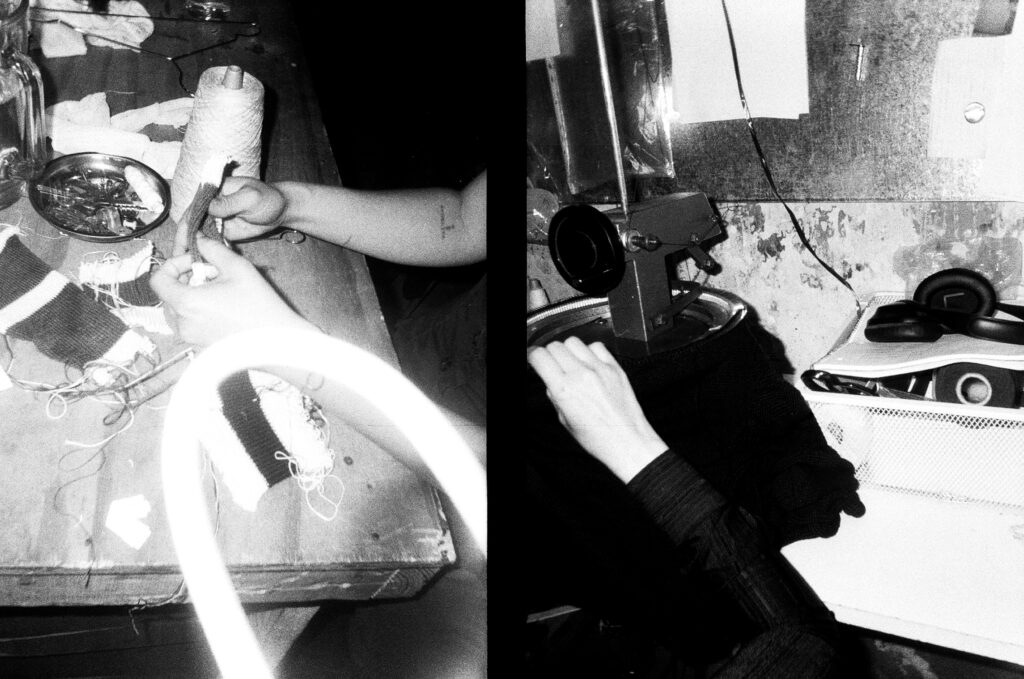
Manos tejedoras.
"Diseñar con knitwear es liberador. Creo mis propias fórmulas e invento mis propios patrones según lo que quiera lograr. El tejido se estira, se comprime, y puede tener la tensión que yo quiera. Es transformativo."
“Me interesa la arquitectura de la silueta”, dice Krystal. Sus prendas no buscan dominar al cuerpo, sino acompañarlo. Son transformativas en el sentido más vital: se adaptan y se resignifican con cada persona que las usa. El knitwear es su medio por excelencia: es un material maleable, técnico pero sensible, donde las reglas pueden romperse con intención. “Me encanta porque tengo control total del material. Me da flexibilidad. Se estira, se comprime, hay formas que no puedes hacer con algodón. Con el tejido de hilo de fibras naturales puedo crear mis propias fórmulas que exigen tener una buena técnica, pero que también me permiten jugar.” Las prendas tejidas, se hacen con cariño, requieren atención, paciencia y una gran capacidad de observación: basta un paso mal para que todo se deshaga. “En el mundo del knitwear hay un tipo de personalidad muy particular y notable: hay humildad y paciencia.”
Tras un programa de posgrado en Londres, vivir la precariedad del mundo de la moda desde adentro, y enfrentarse a otros entornos hostiles, hubo la casualidad de que, en el hostal de enfrente de su desfile de graduación, se hospedaban unos periodistas de Vogue y la entrevistaron. A partir de ahí, la contactaron Dazed y i.D. para escribir notas sobre ella y su trabajo, las cuales le ayudaron a catapultarse y darle visibilidad y reconocimiento a su trabajo. HQI, un espacio de estudios creativos, le ofreció espacios gratis, y fue parte de Generation Next 2020, un programa de reconocimiento anual de talentos emergentes destacados de Teen Vogue. A pesar de la apertura de todas estas puertas, ella seguía sin tener este sentido de pertenencia, y con muchas limitaciones.
En 2022 llegó por primera vez a México, solamente de vacaciones. “Fue una grata sorpresa. Me sentí en casa, y encontré una comunidad latina, que es lo que soy.” Tomó la decisión de quedarse, abrir su estudio en Proyectos Públicos, formar un equipo, aprender a delegar, ser líder. En 2024, registró Krystal Paniagua oficialmente como marca. “¡Es muy reciente! (Ríe). ¡No era tan en serio!. Pero ahora sí. Estoy construyendo fundaciones sólidas para un negocio sustentable.”
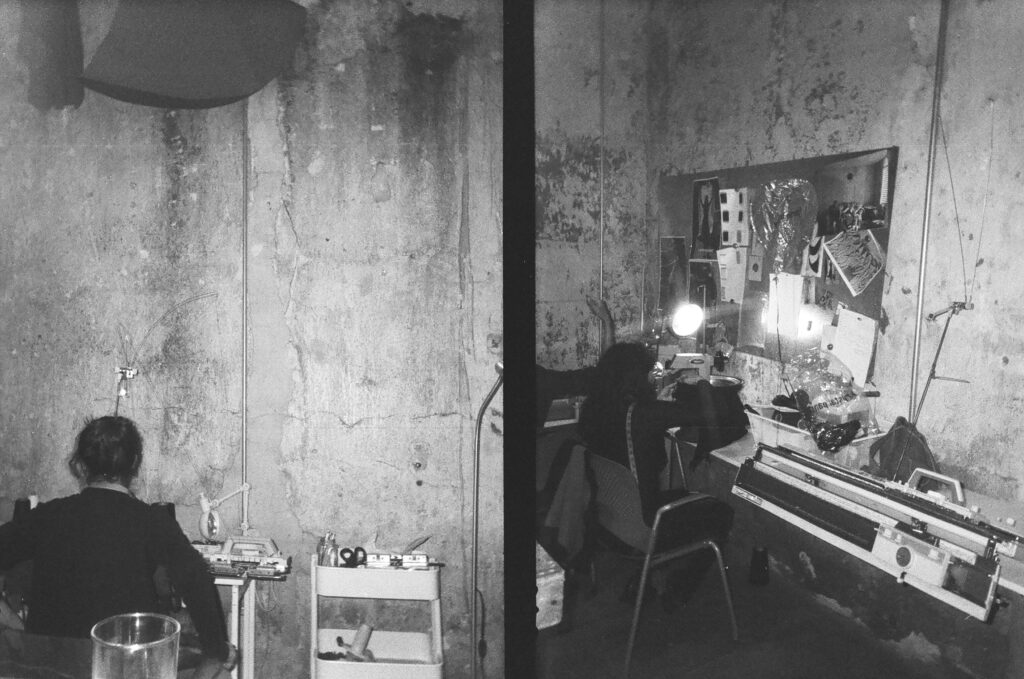
Fran + Helen.
A los 31 años, ya no tiene que rendirle cuentas a nadie. “Me gusta quién soy. Encontré mi identidad. A veces sigo siendo muy dura conmigo misma. Ser tan estricta y juzgar mi trabajo es una bendición y maldición al mismo tiempo, pero también veo que estamos llegando a donde queríamos.”
"Lo importante ahora es tener un equipo fuerte, poder pagarles bien, crecer juntas. Esa es la prioridad. Y seguir explorando, porque hay tanto por hacer todavía..."
Su sueño no es solamente hacer ropa. Busca lograr que su marca se convierta en una plataforma multidisciplinaria, en la que puedan tener músicos, bandas invitadas, pop-ups colaborativos, cenas, residencias, y descubrir talentos, para explorar el mundo de la marca más allá de las prendas. También para servir como una red de apoyo a otros proyectos, siendo muy consciente de cuánto le ayudó el apoyo que logró tener para el crecimiento de su marca, y con ánimos de retribuir a quien lo necesite en el mismo proceso. “Fui parte de un sistema de apoyo que agradezco, y me gustaría replicarlo.”
El trabajo de Krystal Paniagua recuerda que la belleza también está en lo imperfecto, en lo que toma tiempo en construirse, en lo que se hace en compañía. Su práctica, íntima y valiente, nos invita a imaginar otras formas de percibirnos, de representarnos, y de habitar el cuerpo. Ella habla con claridad, pero también con dulzura. Como sus hilos, sus ideas se entrelazan con firmeza y sensibilidad. Y eso, en sí mismo, ya es un acto de ternura radical.
